Welcome to my ultimate guide to basic Japanese phrases for tourists. Whether you’re planning a trip to Japan or have already arrived, this article is designed to help you navigate the language and culture with confidence.
As someone who currently lives in Japan and had to immerse myself in the language, I’ve curated over 100 essential phrases and vocabulary words, with clear explanations on when and how to use them. From common greetings to ordering food, and answering questions, you’ll be equipped with the basic Japanese phrases that are most useful for tourists and first time visitors.
I will also dive into the unique nuances of Japanese pronunciation, characters, and punctuation, giving you a deeper understanding of the language. Plus, this will help you learn about Japanese culture, including proper bowing techniques and slang words to help you connect with locals.
Whether it’s your first time in Japan or are a seasoned traveller, my expert insights into the Japanese language will enrich your experience and make every interaction with Japanese native speakers more meaningful.
Table of Contents
- About Japanese language
- Japanese Characters
- Japanese Punctuation
- Japanese Pronunciation
- Common Japanese Phrases for Greetings
- Japanese Phrases for meeting for the first time
- Essential Japanese phrases to express politeness
- Common answers in Japanese
- Japanese phrases to say goodbye
- Common Japanese Phrases for clarification
- Japanese numbers 1-10
- Useful basic Japanese phrases (and words) for restaurants
- Useful Japanese phrases for tourists
- Cute and cool Japanese words
- Japanese culture
- Bowing
- Politeness
- Learn more Japanese phrases
- Frequently Asked Questions
About Japanese language
Learning Japanese phrases can feel intimidating, but don’t worry, this article is designed to lead you step by step through the basic Japanese phrases for tourists that will be most useful when visiting Japan. Speaking Japanese fluently requires a few years of commitment, but the idea is to start with a few useful Japanese words and basic phrases before further immersing yourself in the language.
Japanese Characters
The Japanese language uses a set of symbols called hiragana, katakana, and kanji.
Hiragana is used to spell Japanese words and this is the first thing children learn in school too. In the picture below you will see the full Hiragana chart with its core symbols, modified symbols (will discuss further in the article) and combined symbols.
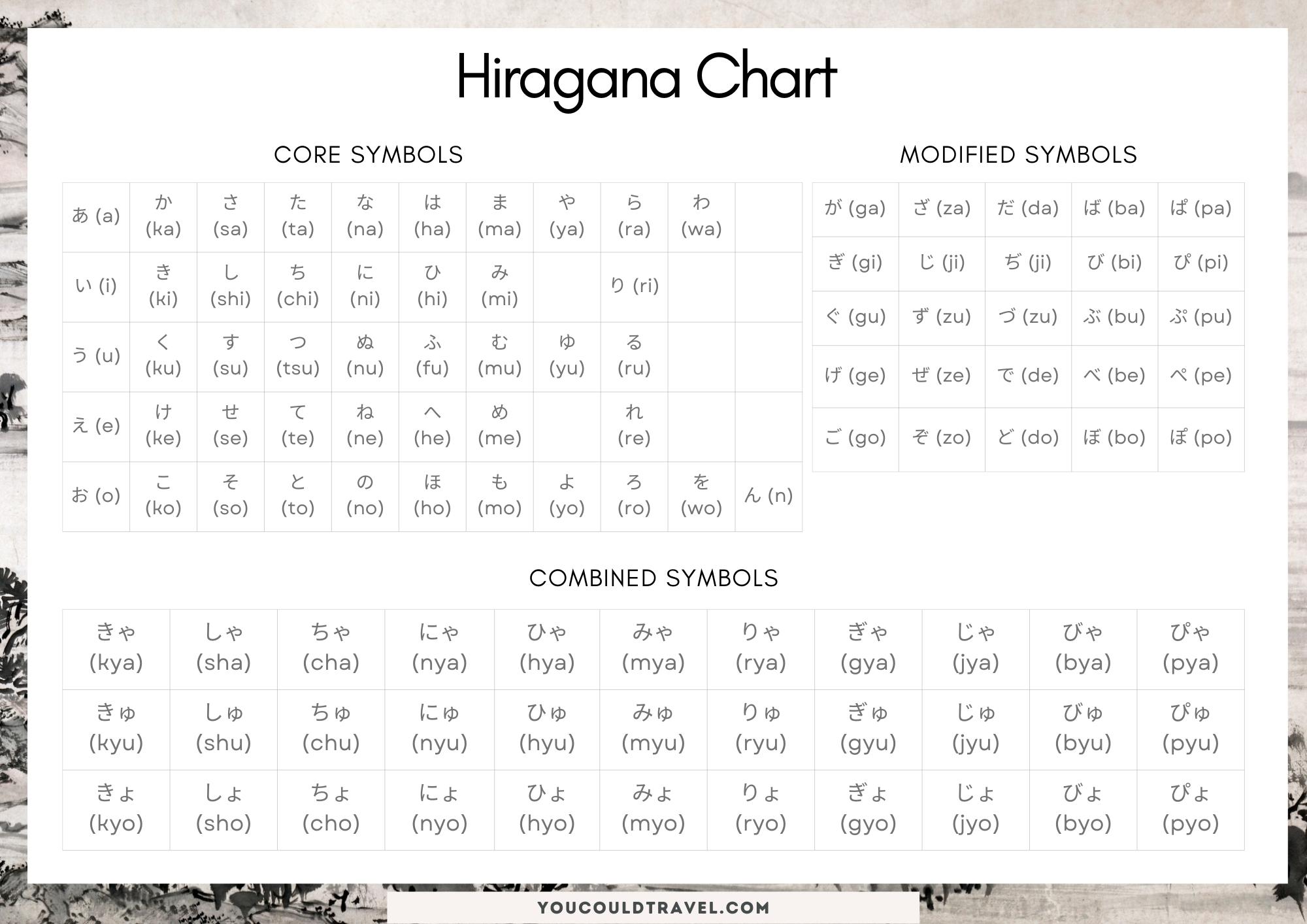
Katakana is used to spell foreign words. In the picture below you will find the full katakana chart with its core, modified and combined symbols.
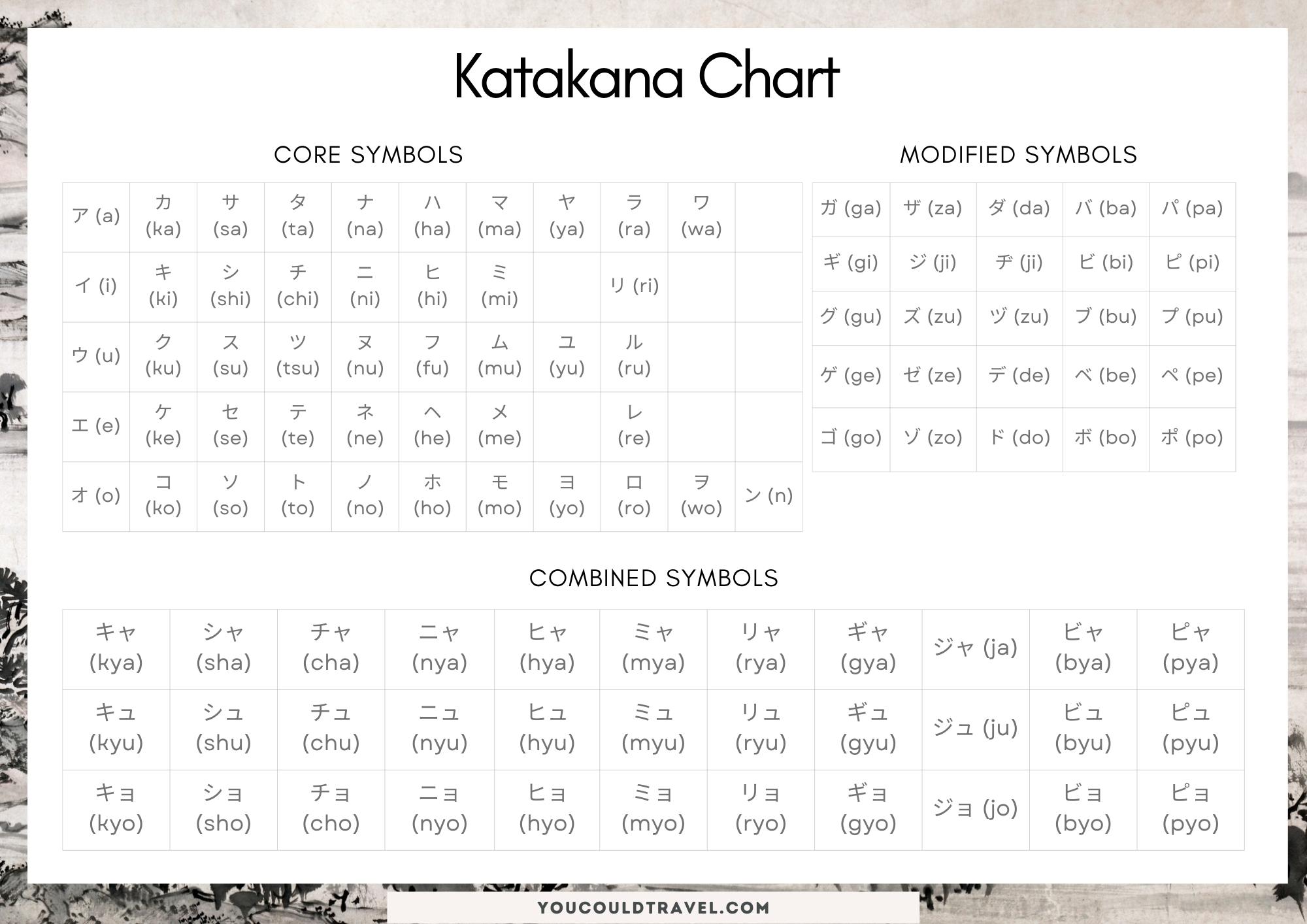
Kanji is used to represent entire words or names. One easy way to think about it is that kanji are in a sense like emojis.
In this article, I will spell everything in a combination of Hiragana, Katakana, Kanji and Romanji. Romanji are Japanese words spelled with Roman letters. To keep it simple, I will only use kanji when strictly necessary.
Japanese Punctuation
To help you get started, there are a few things you need to know about Japanese punctuation. In English, we learn how to spell the uppercase and lowercase of every letter of the alphabet, but this is not the case for Japanese. The Japanese letter あ remains the same regardless of where you find it in the sentence.
Written Japanese doesn’t usually have a question mark (?) at the end of the phrase. Instead, Japanese uses the hiragana か (ka) to signify that the sentence is a question.
Periods in Japanese are a small circle and not a dot, like this (。).
The exclamation mark is just like the western one (!).
Another essential point I want to make is the use of ゛ called Dakuten or Tenten. They may look a little like slanted quotation marks, but they are purely part of the Japanese letters. For example, the kana す = su when written with dakuten becomes ず = zu.
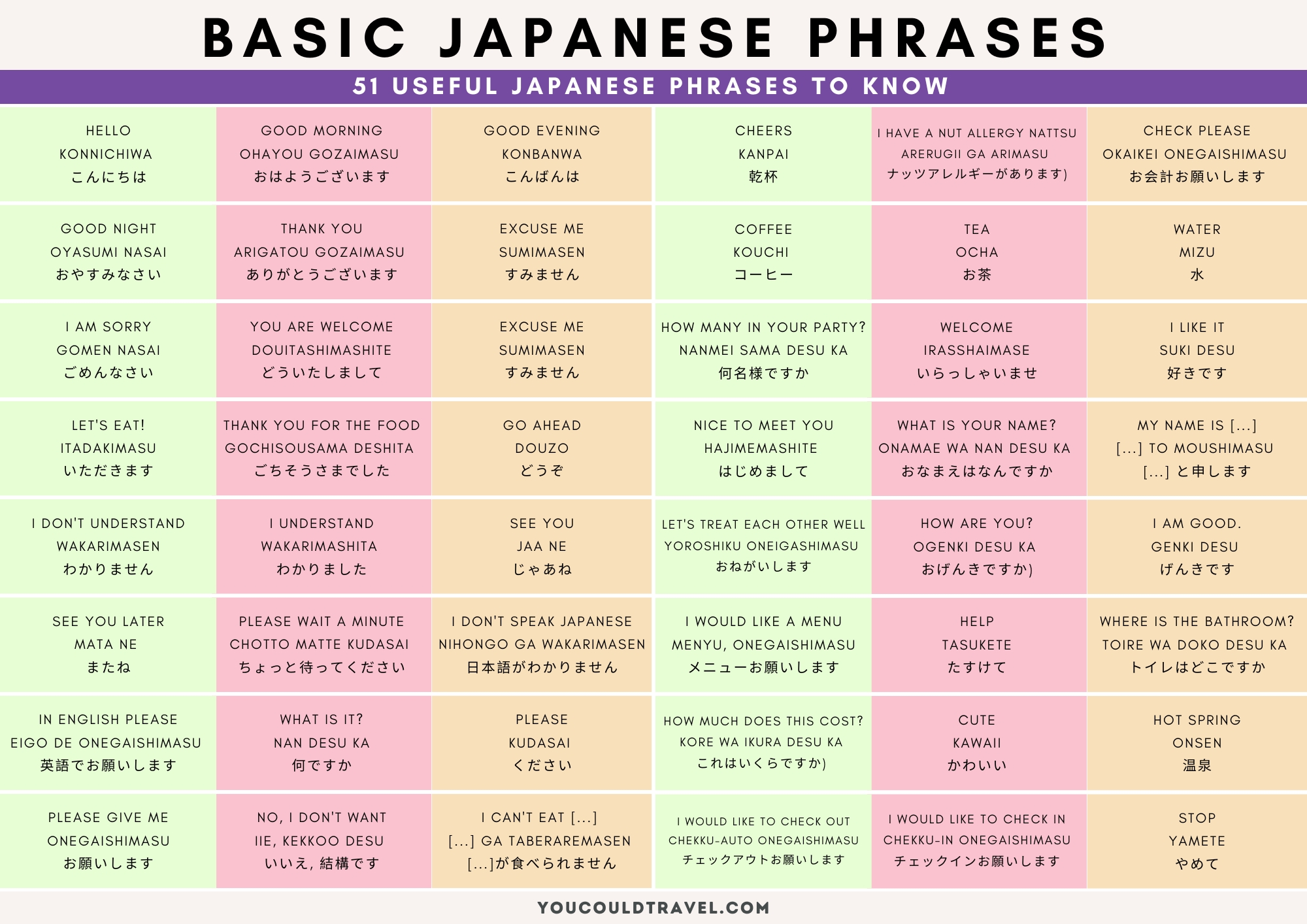
Japanese Pronunciation
The great news is that you can sound great in Japanese right from the start. You need little over a hundred sounds to speak Japanese, and because of this, it is much easier to learn natural Japanese pronunciation.
Here is what you need to know:
- Normal vowels – These sounds are short and simple. Make sure to not slide or lengthen them in any way.
- Double vowels – Some sounds will be lengthened. You will see that some vowels simply repeat, like in the word okaasan (mother). This just means you need to lengthen the sound a little. You will also see these vowels with a straight line over them to represent the lengthened vowel. The easier example is Tōkyō. The correct way to pronounce it is Tookyoo.
- Long vs short sounds – Just try to lengthen the sounds when you see them written as such because the meaning of the Japanese words can be easily changed. For example, ie = house whereas iie = no.
- Double consonants – Same as with the vowels, some Japanese words will have double consonant sounds. The trick is to stress the consonant, almost like a little stop. Much like the long and short vowels, short or long consonants will change the meaning of the word if not said correctly. For example, roku = number six, whereas rokku = rock music.
In Japanese, some words end with a “u” sound that is often silent or only lightly pronounced. This sound is known as “unvoiced u” or “u-ending”. In Japanese, the pronunciation of the “u” sound at the end of words like “desu”(です) and “masu”(ます) is usually a light, unvoiced sound that is pronounced quickly, almost like a whisper.
Common Japanese Phrases for Greetings
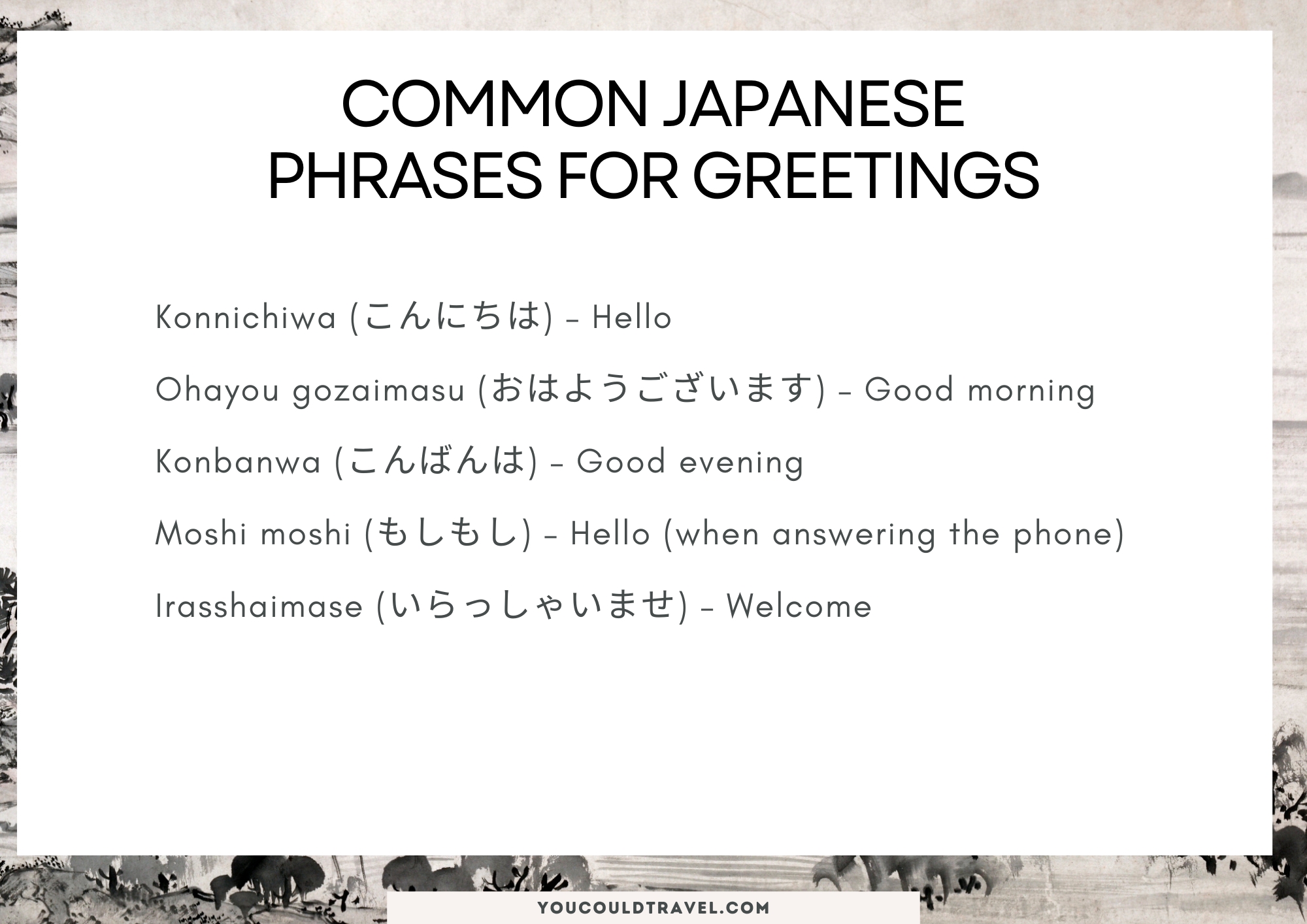
These are the most useful Japanese phrases for when you meet someone. You will want to greet them and say hello. The same as in English, there are more than one way to say hello, depending on where you meet and what time of the day it is. There are even differences between saying hello to a person you meet face to face and a person you talk to over the phone.
- Konnichiwa (こんにちは) – Hello. This works for both formal and informal.
- Ohayou gozaimasu (おはようございます) – Good morning. This is the formal expression.
- Ohayou (おはよう) – Good morning but informal, usually used among family and friends.
- Konbanwa (こんばんは) – Good evening. This is formal and not typically used with close ones.
- Moshi moshi (もしもし) – It means hello, but only when you answer the phone or greet someone when talking via video conferencing apps.
- Irasshaimase (いらっしゃいませ) – Welcome. You will be greeted this way when entering a shop or restaurant. You can reply with a simple head bow.
Japanese Phrases for meeting for the first time
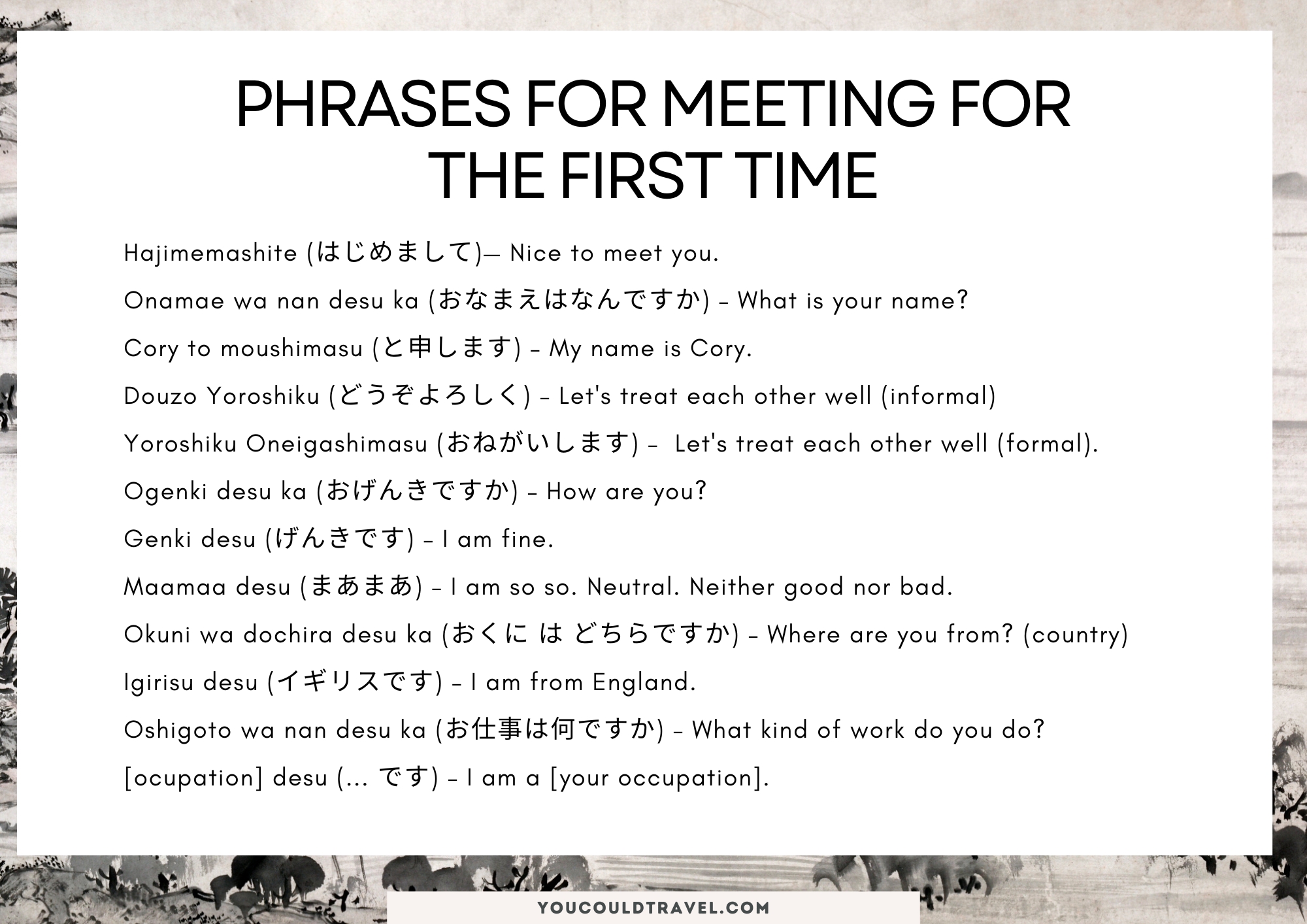
These are common phrases used when you meet someone for the first time. Usually, you will start by saying “Nice to meet you”, introduce yourself, then ask kindly to treat each other well. Furthermore, I added expressions and questions you would ask someone you meet for the first time, like what is their name, how they are, where they come from and what they do for work.
- Hajimemashite (はじめまして) – Nice to meet you. This phrase is only used when meeting someone for the first time. Very important, when pronouncing hajimemashite, the “i” in “mashite” is silent. It will sound like mashte, so hajimemashte.
- Onamae wa nan desu ka (おなまえはなんですか) – What is your name? It’s a polite way to ask someone’s name, and you should always use this expression when meeting someone for the first time. The O is a prefix used to make its following word polite. In the expression, it is put before the noun, “namae”, to make it sound polite.
- Watashi wa Cory desu (わたしは Cory です) – My name is Cory. Although the literal translation is I am Cory. Whilst it is correct grammatically, it is not as common, and it’s the way foreigners learn it to begin it.
- Cory to moushimasu (と申します) – My name is Cory. This is the preferred and the correct way to introduce yourself in Japan. This is very polite and humble, and the translation is I am called Cory. It’s how a native Japanese speaker would introduce themselves.
- Douzo Yoroshiku (どうぞよろしく) – There is no real translation for this in English but it means something along the line, let’s treat each other well. It sort of means nice to meet you, but this version is casual and informal.
- Yoroshiku Oneigashimasu (おねがいします) – This is also nice to meet you, let’s treat each other well but in a formal way. This is what you would use when meeting an elderly stranger, someone new in Japan who’s an adult, or when doing business with someone.
- Ogenki desu ka (おげんきですか) – How are you?
- Genki desu (げんきです) – I am fine.
- Maamaa desu (まあまあ) – I am so so. Neutral. Neither good nor bad.
- Okuni wa dochira desu ka (おくに は どちらですか) – Where are you from? (country)
- Igirisu desu (イギリスです) – I am from England.
- Oshigoto wa nan desu ka (お仕事は何ですか) – What kind of work do you do?
- [occupation] desu (… です) – I am a [your occupation]. In my case, I would say Ryokō sakka desu (I am a travel writer) or Kisha desu (I am a journalist).
Essential Japanese phrases to express politeness
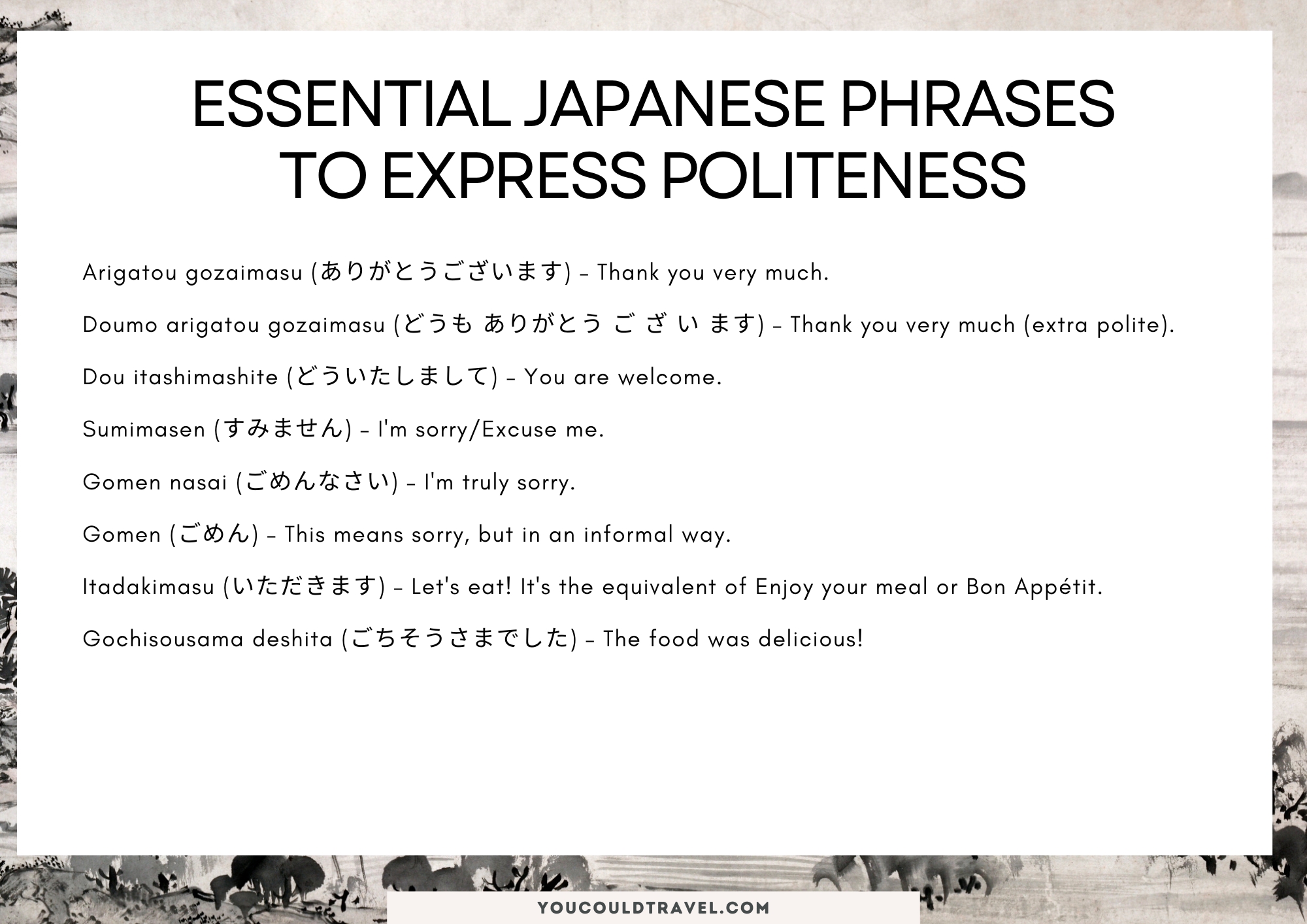
The Japanese are very polite, and they have many ways to express this. Whether they say thank you in a specific way or they ask for things using humble expressions. Below you will find some Japanese phrases that you will very likely use these on a day to day when you are in Japan. Just remember to always say Arigatou gozaimasu when you thank someone for something, especially a stranger. This is the correct and polite way of saying so. If you wish to be thankful for the food in front of you, bring your hands together in prayer and say Itadakimasu. It’s short and sweet and as I explain below it has more than one meaning to express gratitude for the food. Finally, when you finish eating, always say Gochisousama deshita which means that the food was delicious. You can say this when someone removes your plate or when you go to pay at the cashier.
- Arigatou gozaimasu (ありがとうございます) – Thank you very much. It’s nice and polite.
- Arigatou (ありがとう) – Thanks! It’s way less formal and sometimes can feel a little impolite on its own.
- Doumo arigatou gozaimasu (どうも ありがとう ご ざ い ます) – Thank you very much in an extra polite way. You would use this when someone really went the extra mile for you to help you.
- Dou itashimashite (どういたしまして) – You are welcome. This is the correct reply to any form of thanks, as seen above.
- Sumimasen (すみません) – I’m sorry/Excuse me. Sumimasen is very common in Japanese, much like in English. You’d say excuse me, can you please help me? Or when you bump into someone, you’d say, sorry, excuse me, and so on. It’s used in a very similar fashion.
- Gomen nasai (ごめんなさい) – This is a real apology. It’s like saying “I’m truly sorry from the bottom of my heart, forgive me”.
- Gomen (ごめん) – This means sorry, but in an informal way. Chances are, when you are in Japan, and someone bumps into you, they might just say Gomen. Children and young people use this abbreviation as a colloquial way to ask for forgiveness.
- Itadakimasu (いただきます) – Let’s eat! It’s the equivalent of Enjoy your meal or Bon Appétit in French. However, Itadakimasu expresses gratitude in Japanese, and it’s more than just a word used before enjoying a meal. It implied appreciation for the person who cooked, for the life we took to be able to create this food, and for deities who provide food for us.
- Gochisousama deshita (ごちそうさまでした)—The food was delicious! Failing to say this could show disrespect. Almost everyone says it when paying the bill or when approaching the cashier. It’s more than a thanks for the food, it means that you liked it and appreciated the effort put into the food which was made for you.
Common answers in Japanese
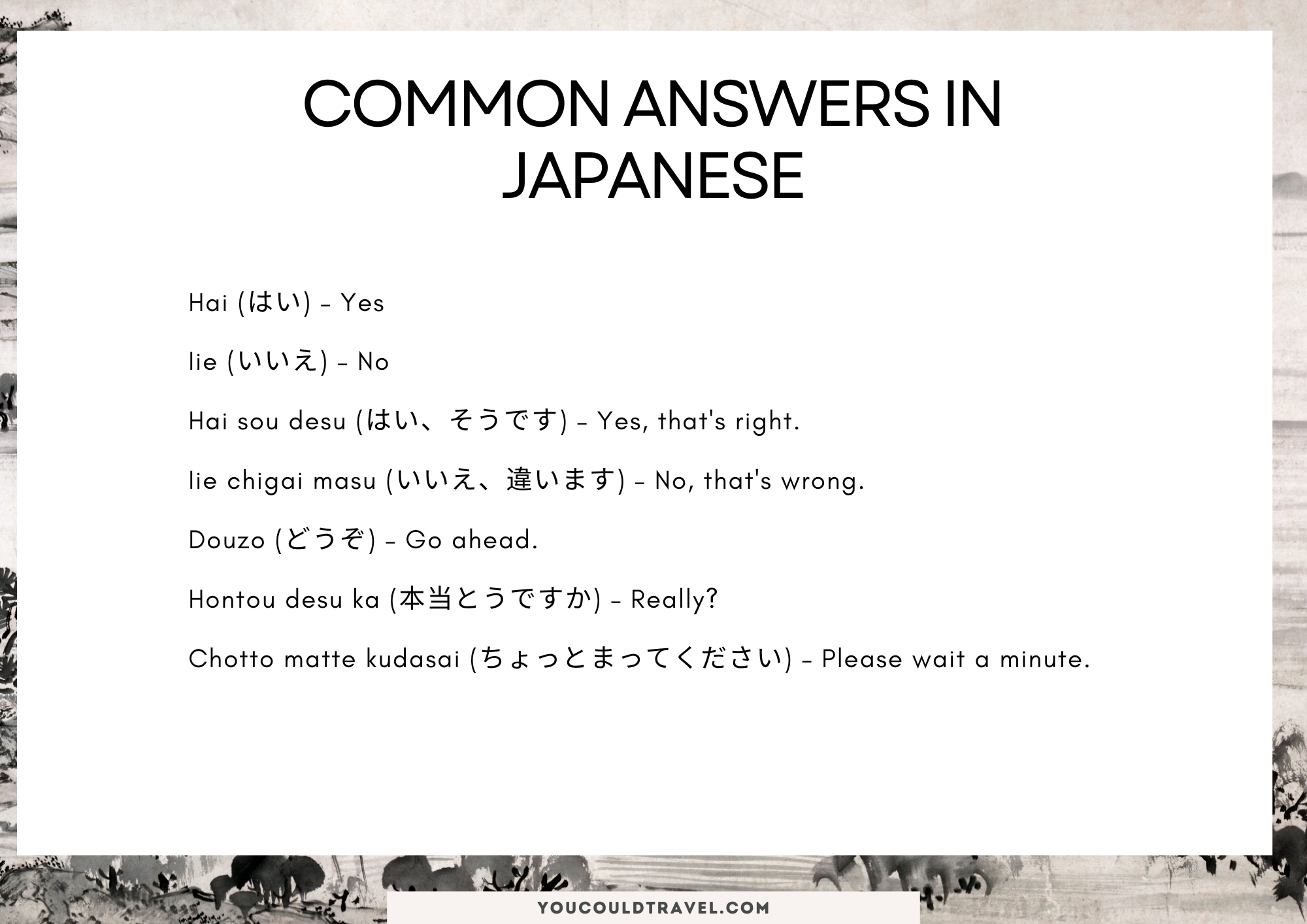
Something you will be asked a question in Japanese and you need to know how to reply depending on the circumstance. Or you might ask a question, and you need to know what it’s been said to you. For example, when someone asks you if you wish to get a bag, you can say yes or no. If you ask for a table for two in a restaurant, the person might tell you “douzo” which simply means please, go ahead. Here are the most common answers you need to know in Japanese.
- Hai (はい) – Yes
- Iie (いいえ) – No
- Hai sou desu (はい、そうです) – Yes, that’s right.
- Iie chigai masu (いいえ、違います) – No, that’s wrong.
- Douzo (どうぞ) – Go ahead.
- Hontou desu ka (本当とうですか) – Really?
- Chotto matte kudasai (ちょっとまってください) – Please wait a minute.
Japanese phrases to say goodbye
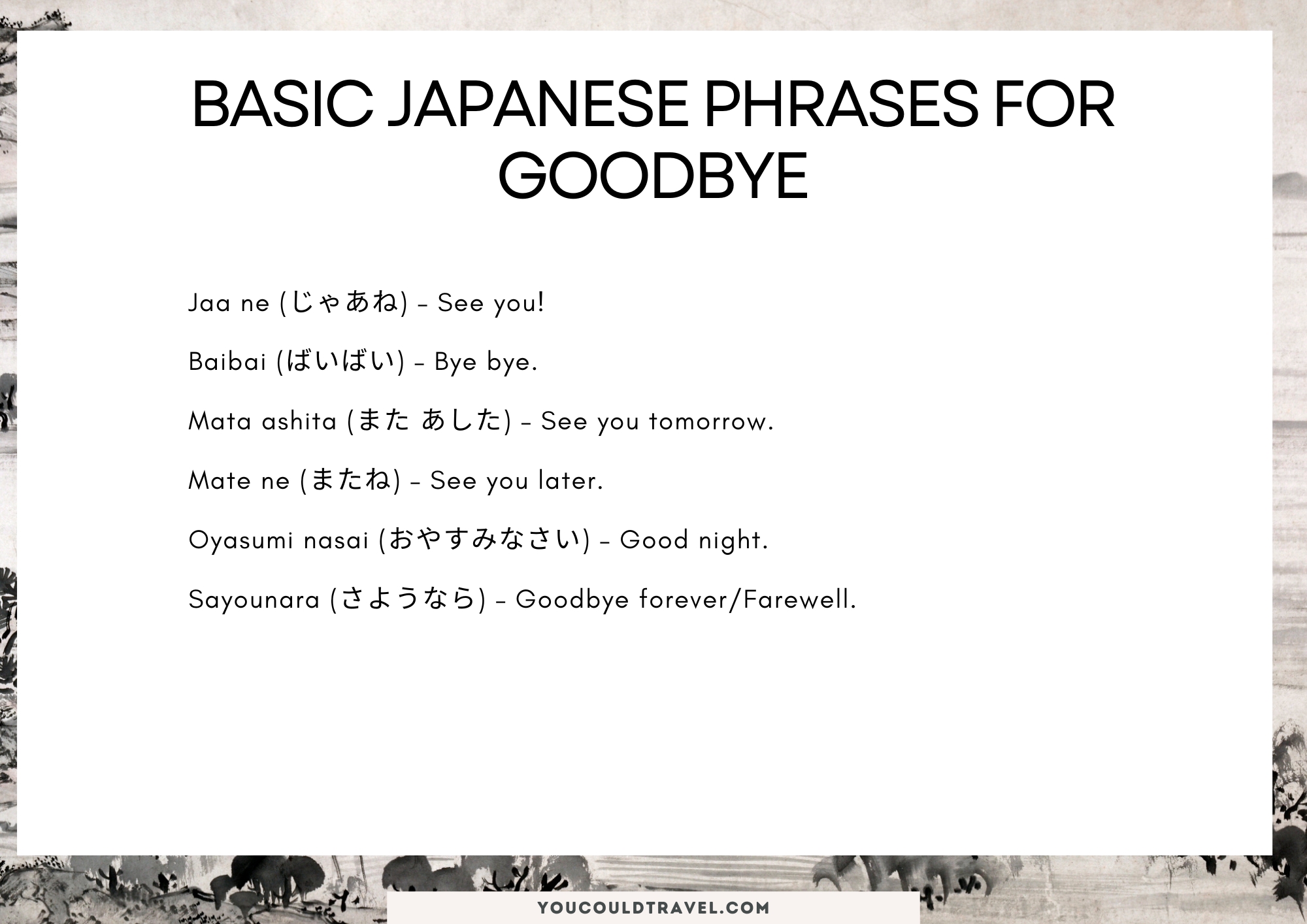
The truth is there are many ways to say goodbye depending on where you are and who you talk to. You can be casual with your friends and family, say bye in an office environment, or just be cool about it and use a more western way. Please, please remember that nobody uses “sayounara” unless it really is goodbye forever. This is a type of profound farewell for breakups or when people move away. It’s not applicable when you just say bye or see you later. For example, it would be very inappropriate to say this at the end of a business meeting, when you exit a restaurant or when you check out of your hotel. If in doubt, just say thank you and leave. That’s perfectly adequate in most touristy instances when you are a customer.
- Jaa ne (じゃあね) – See you
- Baibai (ばいばい) – Bye bye
- Mata ashita (また あした) – See you tomorrow
- Mate ne (またね) – See you later.
- Oyasumi nasai (おやすみなさい) – Good night. It’s a nice and formal way to wish someone good night. To make it sound casual, you can just say oyasumi to friends and family.
- Sayounara (さようなら) – Goodbye forever. It’s not common to say this in Japanese unless you are parting with the person forever.
Common Japanese Phrases for clarification
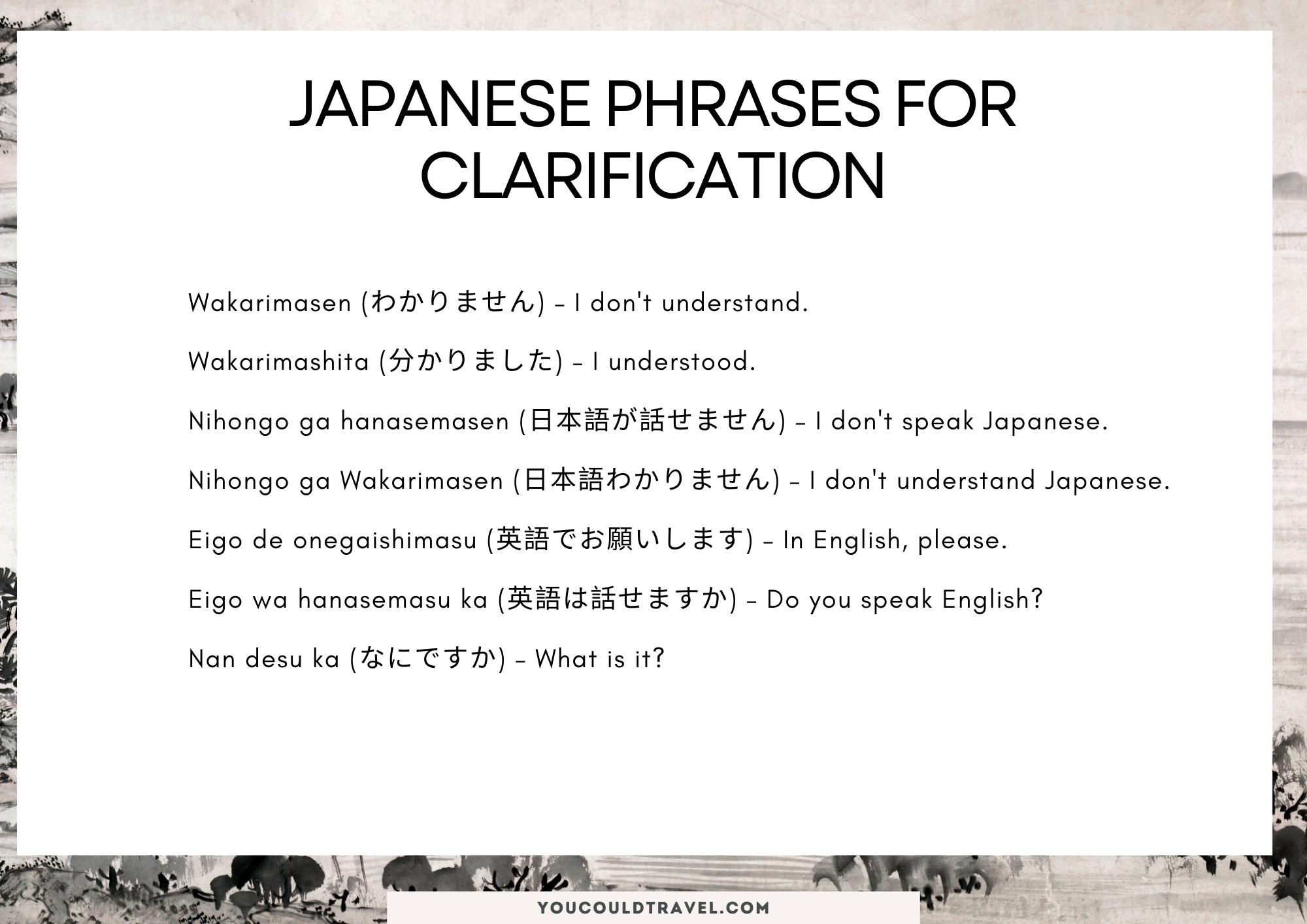
These are common phrases for when you need to tell someone that you do, or you do not understand them. These will also be useful for when you need to ask someone to speak in English, or politely ask if they can speak English back. Before we dive in, I want to talk a little bit about Japanese particles, which may affect the meaning you wish to convey in a sentence.
Let’s look at the sentence “Do you speak English” which can be asked in three different ways: “Eigo ga hanasemasu ka” “Eigo wa hanasemasu ka” and “Eigo o hanasemasu ka”
The difference between “Eigo ga hanasemasu ka,” “Eigo wa hanasemasu ka,” and “Eigo o hanasemasu ka” lies in the particles used to denote the subject, topic, and object of the sentence.
“Eigo ga hanasemasu ka” asks if you can speak English, with “ga” marking “English” as the subject of the sentence.
“Eigo wa hanasemasu ka” asks if you can speak English, with “wa” marking “English” as the topic of the sentence.
“Eigo o hanasemasu ka” asks if you can speak English, with “o” marking “English” as the direct object of the sentence.
Overall, “ga” emphasizes the subject, “wa” emphasizes the topic, and “o” emphasizes the object in the sentence.
- Wakarimasen (わかりません) – I don’t understand.
- Wakarimashita (分かりました) – I understood.
- Nihongo ga hanasemasen (日本語が話せません) – I don’t speak Japanese.
- Nihongo ga Wakarimasen (日本語わかりません) – I don’t understand Japanese.
- Eigo de onegaishimasu (英語でお願いします) – In English, please.
- Eigo wa hanasemasu ka (英語は話せますか) – Do you speak English?
- Nan desu ka (なにですか) – What is it?
Japanese numbers 1-10
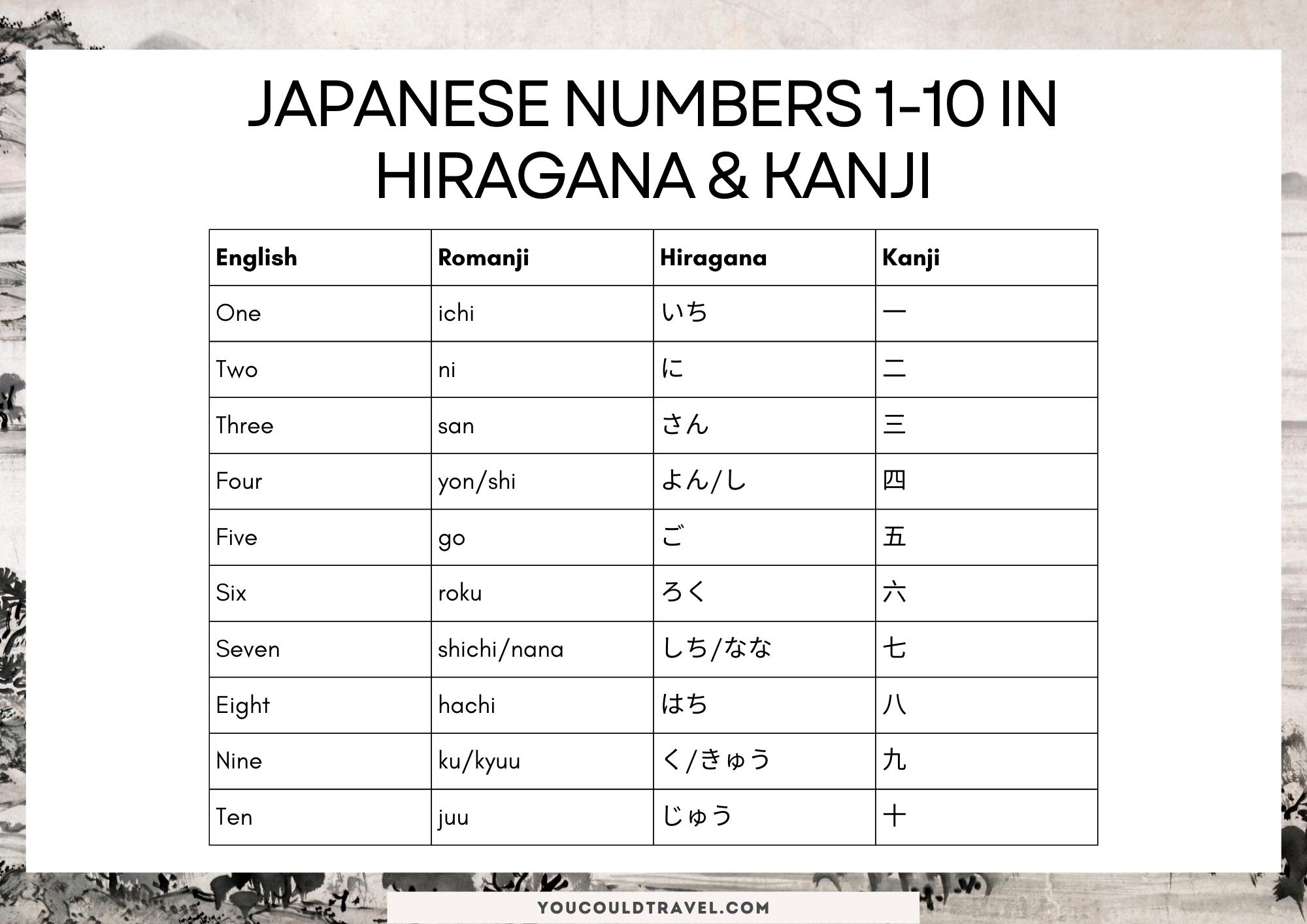
Here is how to count from 1 to 10 in Japanese. Just remember that some numbers like 4,7 and 9 have two versions, and it’s important to know why to pick the correct one in conversation. It’s important to keep in mind that there are different ways of counting and reading numbers in Japanese, depending on the context and the types of numbers being used. For example, there are different counters for different types of objects, such as people, animals, flat objects, long objects, and so on. In general, it’s a good idea to study the basics of Japanese numerals.
- Ichi (いち) – One
- Ni (に) – Two
- San (さん) – Three
- Yon (よん) – Four*
- Go (ご) – Five
- Roku (ろく) – Six
- Nana (なな) – Seven*
- Hachi (はち) – Eight
- Kyu (きゅう) – Nine*
- Juu (じゅう) – Ten
The numbers with * have more than one version. Occasionally, you need to use one version instead of the other. There are cultural reasons behind having different versions.
The number four in Japanese is yon (よん) or shi (し). But shi means death, so you can appreciate, you wouldn’t want to use this version in most cases.
Seven in Japanese is nana (なな) or shichi (しち) which again is too akin to the word for death, so nana is more widely used.
Nine in Japanese is kyuu (きゅう) or ku (く). Ku means suffering, which is why you will hear kyuu being used more frequently.
Numbers 4 and 9 are considered unlucky in Japan. When I lived in Japan, our residential block didn’t have flats numbered 4 or 9.
Useful basic Japanese phrases (and words) for restaurants
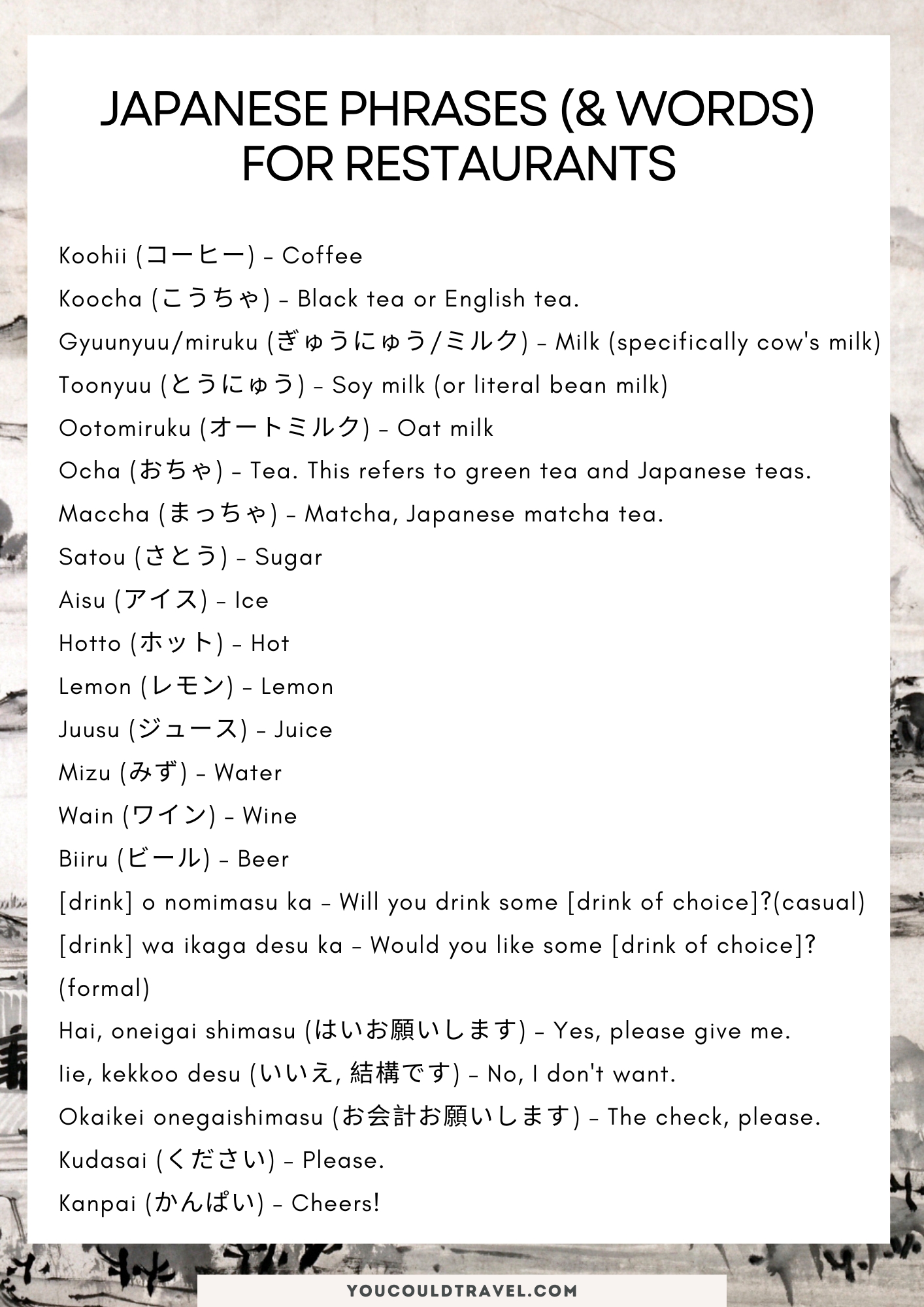
Eating Japanese food and Japanese desserts is the best thing ever, but how do you say basic Japanese phrases in a restaurant? First, please be aware that there is an etiquette for eating in a Japanese restaurant, so make you familiarise yourself with it. I added below some of the most useful words and phrases you need to know to be able to order food and drinks and understand what the waiter/barista might be asking you. Remember that Gyuunyuu/miruku refers to cow’s milk specifically, and you should always ask for Toonyuu or Ootomiruku BEFORE you order. Some cafés won’t have alternative milks but large chains will always have some. When ordering coffee, you will also notice that you will always be asked if you want Aisu / Hotto. You can simply reply by saying your preference, then adding onegaishimasu. So I wanted a cold coffee, I would say Hotto, onegaishimasu. When they give you the coffee, you might hear them say “Hai, Douzo”. This simply means, there you go, here is your item. You can simply reply with “arigatou gozaimasu” as you’ve learned above.
- Koohii (コーヒー) – Coffee
- Koocha (こうちゃ) – Black tea or English tea
- Gyuunyuu/miruku (ぎゅうにゅう/ミルク) – Milk (specifically cow’s milk)
- Toonyuu (とうにゅう) – Soy milk (or literal bean milk)
- Ootomiruku (オートミルク) – Oat milk
- Ocha (おちゃ) – Tea. This refers to green tea and Japanese teas.
- Maccha (まっちゃ) – Matcha, Japanese matcha tea. The term “Matcha” is an Anglicized version of the Japanese word, adapted for English-speaking audiences. However, Maccha is the official spelling recognized by the Japanese government and is primarily used by the Japanese population.
- Satou (さとう) – Sugar
- Aisu (アイス) – Ice
- Hotto (ホット) – Hot
- Lemon (レモン) – Lemon
- Juusu (ジュース) – Juice
- Mizu (みず) – Water
- Wain (ワイン) – Wine
- Biiru (ビール) – Beer
- [drink] o nomimasu ka – Will you drink some [drink of choice]? For example, Ocha o nomimasu ka will translate to, Will you drink some tea? This is more casual, and you won’t hear this in a restaurant, but in a more casual context.
- [drink] wa ikaga desu ka – Would you like some [drink of choice]? This is the polite form, and you will hear it in a restaurant. For example, you could hear a waiter in a restaurant asking you Ocha wa ikaga desu ka, which means Would you like some tea?
- Hai, oneigai shimasu (はいお願いします) – Yes, please give me. It’s very polite and a very nice way to respond.
- Iie, kekkoo desu (いいえ, 結構です) – No, I don’t want. Again, this is a very polite and humble way to refuse something.
- Okaikei onegaishimasu (お会計お願いします) – The check, please.
- Kudasai (ください) – Please.
- Kanpai (かんぱい) – Cheers!
Should you use kudasai or onegaishimasu when asking for something?
For example, you can say O-Mizu o kusadai (water, please) but you can also say O-Mizu o onegaishimasu (Please give me water). Generally, kudasai will be used when you know you are entitled to something, you request something from a friend, peer, or someone from a lower status.
When making a request for service, or you are asking for a favour, you should use onegaishimasu. In a restaurant, you can use kudasai which is like a soft imperative, but onegaishimasu is more polite.
Useful Japanese phrases for tourists
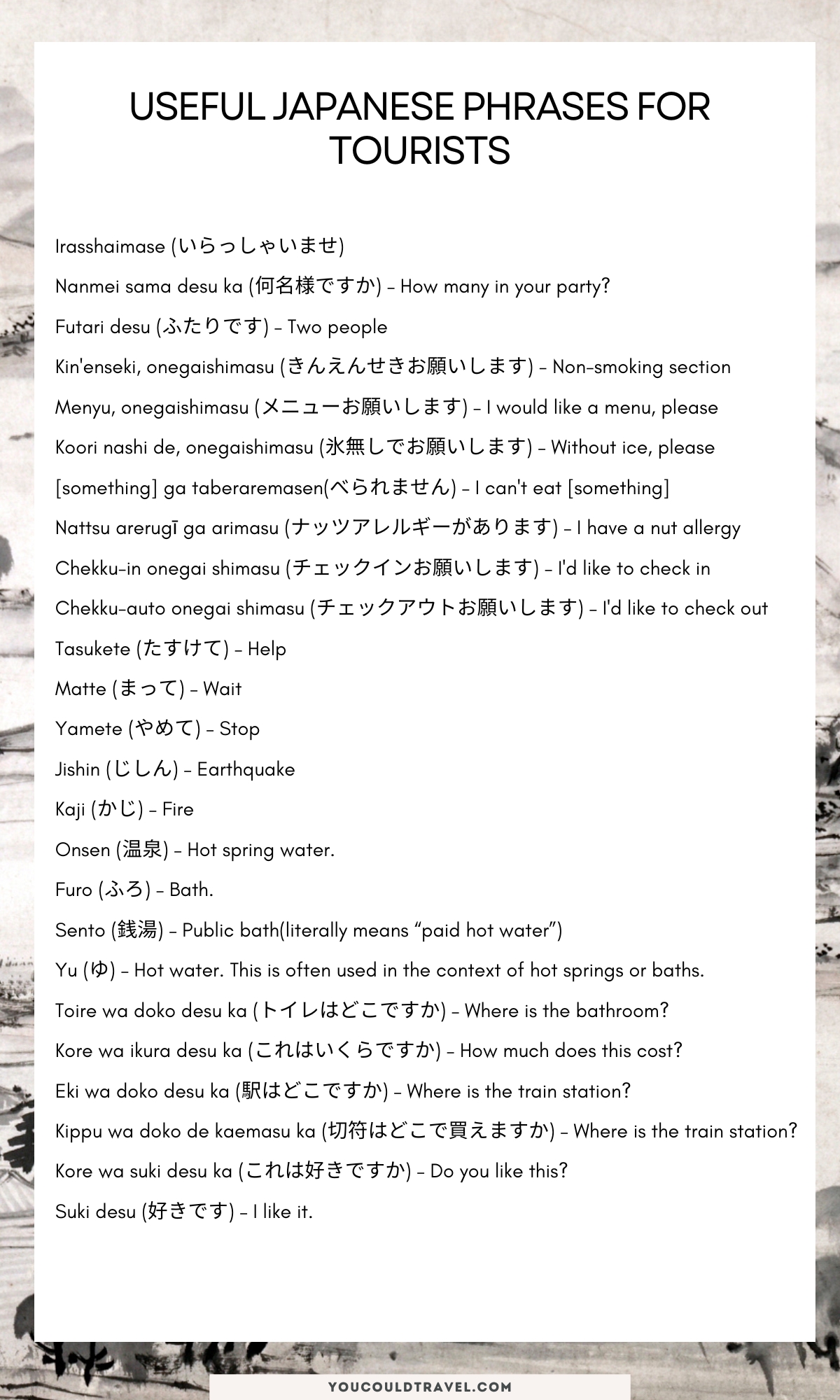
These are a few examples of some very useful Japanese phrases for tourists to learn. With everything I shared above plus all the Japanese phrases below, you will do just fine on your trip to Japan. It’s important to familiarise yourself with most expressions even if you don’t learn them all to ensure you know your way around. Below I added some of the most important phrases you will hear one way or another or need to know for your own safety. I also added the distinctions between an onsen and furo which can get people confused who might want to book a memorable stay in a special ryokan.
- Irasshaimase. Nanmei sama desu ka (いらっしゃいませ。何名様ですか) – Welcome. How many in your party? You will hear this a lot when entering a Japanese restaurant.
- Futari desu (ふたりです) – Two people
- Kin’enseki, onegaishimasu (きんえんせきお願いします) – I’d like to sit in a non-smoking section
- Menyu, onegaishimasu (メニューお願いします) – I would like a menu, please
- Koori nashi de, onegaishimasu (氷無しでお願いします) – Without ice, please
- [something] ga taberaremasen(べられません) – I can’t eat [something]. For example, if you want to say I can’t eat shrimp, you would say ebi ga taberaremasen.
- Nattsu arerugī ga arimasu (ナッツアレルギーがあります) – I have a nut allergy
- Chekku-in onegai shimasu (チェックインお願いします) – I’d like to check in
- Chekku-auto onegai shimasu (チェックアウトお願いします) – I’d like to check out
- Tasukete (たすけて) – Help
- Matte (まって) – Wait
- Yamete (やめて) – Stop
- Jishin (じしん) – Earthquake
- Kaji (かじ) – Fire
- Onsen (温泉) – Hot spring water.
- Furo (ふろ) – Bath. Please note, there is a difference between onsen and furo. This is important for visitors. If you wish to stay in a ryokan but the place advertises that they have a Furo or ofuro rather than an onsen, it just means they use hot water from the tap which may be enhanced with minerals.
- Sento (銭湯) – Public bath(literally means “paid hot water”)
- Yu (ゆ) – Hot water. This is often used in the context of hot springs or baths.
- Toire wa doko desu ka (トイレはどこですか) – Where is the bathroom?
- Kore wa ikura desu ka (これはいくらですか) – How much does this cost?
- Eki wa doko desu ka (駅はどこですか) – Where is the train station?
- Kippu wa doko de kaemasu ka (切符はどこで買えますか) – Where can I buy a ticket?
- Kore wa suki desu ka (これは好きですか) – Do you like this?
- Suki desu (好きです) – I like it.
Cute and cool Japanese words
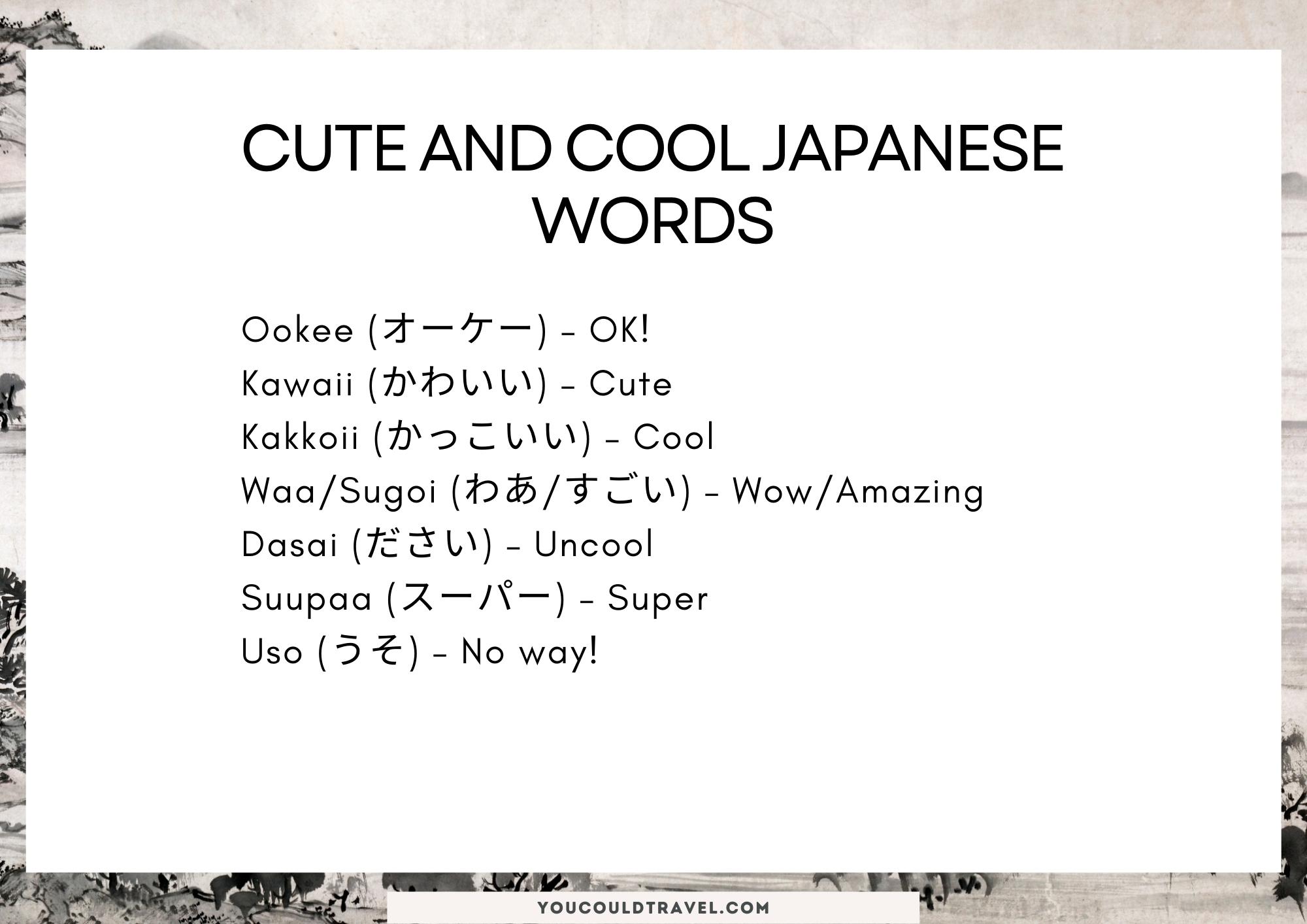
Just a few slang words you will very likely hear used among younger people. These are for next time you wish to visit Harajuku. Of course, there are lots of Japanese slang words out there, but chances are you will only need a handful to begin with. Here are some of my favourite:
- Ookee (オーケー) – OK!
- Kawaii (かわいい) – Cute
- Kakkoii (かっこいい) – Cool
- Waa/Sugoi (わあ/すごい) – Wow/Amazing
- Dasai (ださい) – Uncool
- Suupaa (スーパー) – Super
- Uso (うそ) – No way!
Japanese culture
Japanese culture is rich and complex, and understanding some of its key aspects can be beneficial for someone learning the language. The truth is, to really immerse yourself in learning Japanese and learn more about the culture, the best thing to do is to visit the country at least once. You will be surrounded by Japanese people, and you will see how they react to an everyday Japanese conversation. This will truly enhance your Japanese knowledge and your Japanese vocabulary in a more natural way.
Bowing
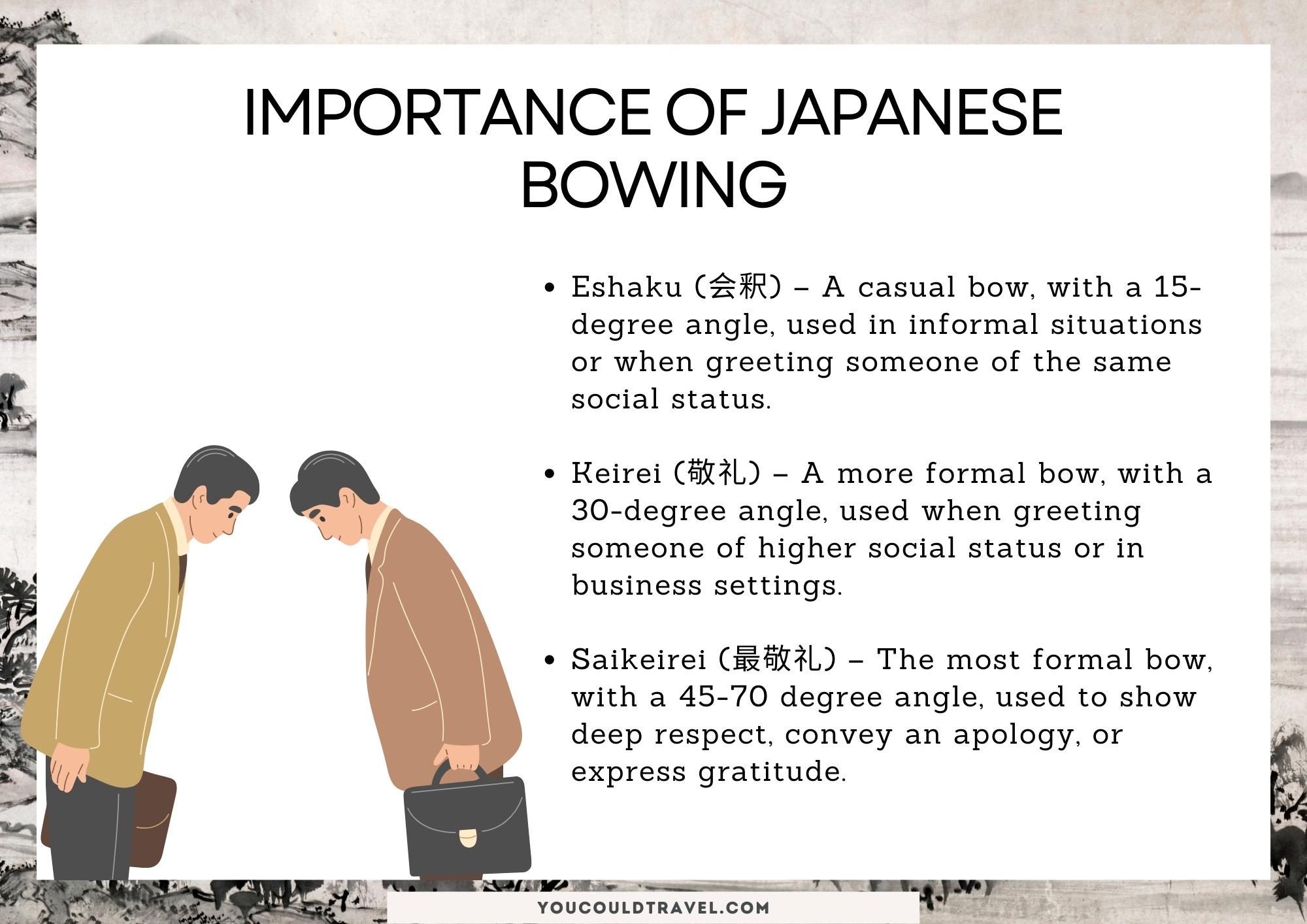
Bowing is an essential part of Japanese etiquette and a non-verbal way to convey respect, gratitude, or apology. There are different types of bows, which vary in the degree of the bow and the situation in which they are used:
- Eshaku (会釈) – A casual bow, with a 15-degree angle, used in informal situations or when greeting someone of the same social status.
- Keirei (敬礼) – A more formal bow, with a 30-degree angle, used when greeting someone of higher social status or in business settings.
- Saikeirei (最敬礼) – The most formal bow, with a 45-70 degree angle, used to show deep respect, convey an apology, or express gratitude.
In general, men bow with their hands at their sides, while women will often place their hands on their thighs with the fingers overlapping or touching. You don’t have to bow back to a person in a store, but it is polite to acknowledge them and offer them a nod.
Politeness
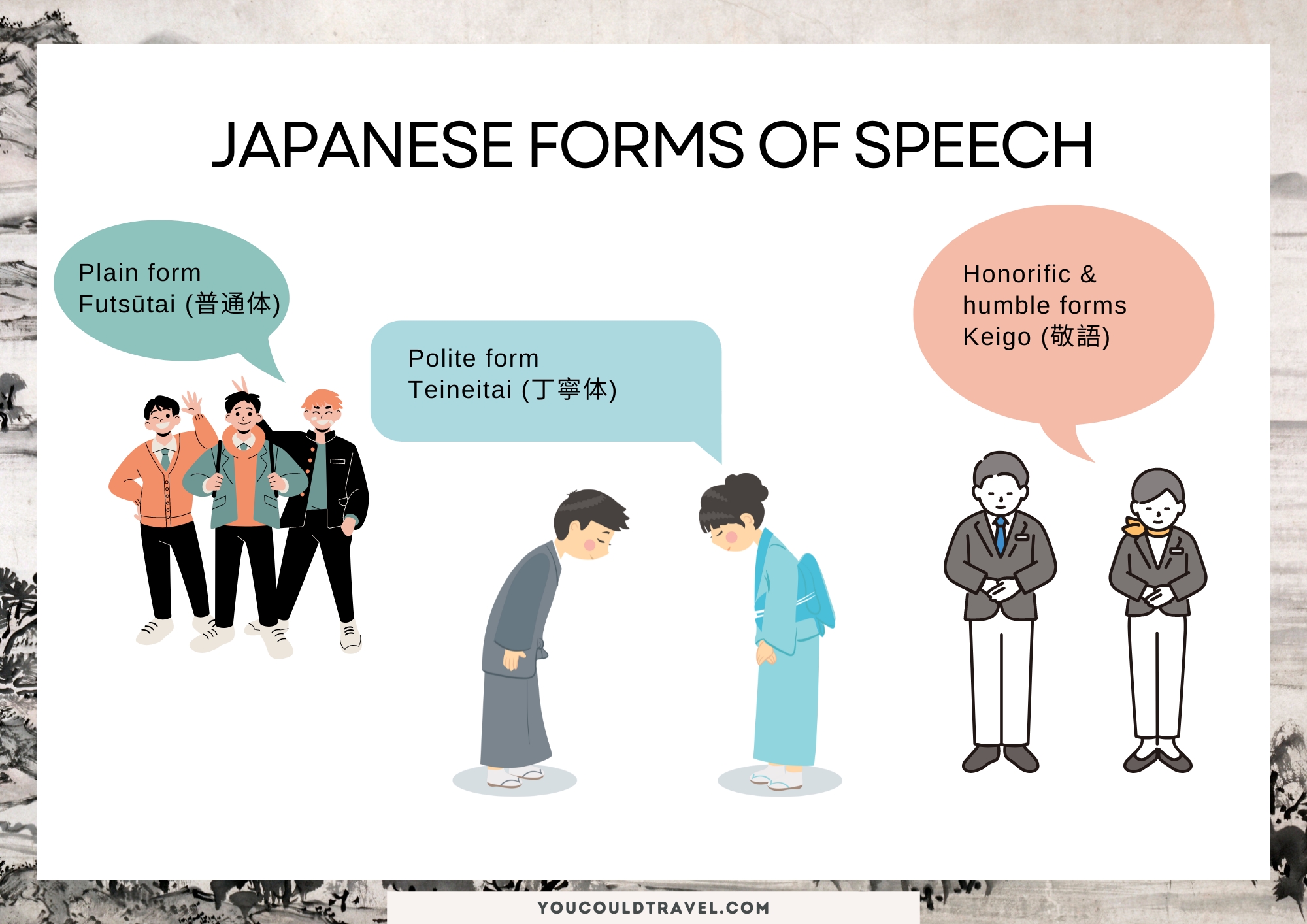
Politeness is highly valued in Japanese society, and the language reflects this importance through various levels of formality and politeness in speech. There are three main politeness levels in Japanese:
- Plain form called Futsūtai (普通体) – Informal speech, used with friends, family, or those of equal or lower social status.
- Polite form called Teineitai (丁寧体) – Formal speech, used with strangers, in business settings, or when speaking to those of higher social status. This form typically uses the verb ending “ます” (masu) and the adjective ending “です” (desu).
- Honorific and humble forms called Keigo (敬語) – These are even more polite forms of speech, used to show extreme respect or humility. Honorifics (尊敬語) elevate the listener’s social status, while humble forms (謙譲語) lower the speaker’s status. These forms often involve different vocabulary and verb conjugations.
If you are fascinated by Japanese manners and customs, I wrote a whole book about it. The book comes with manga drawings created by a super talented Japanese artist.
Learn more Japanese phrases
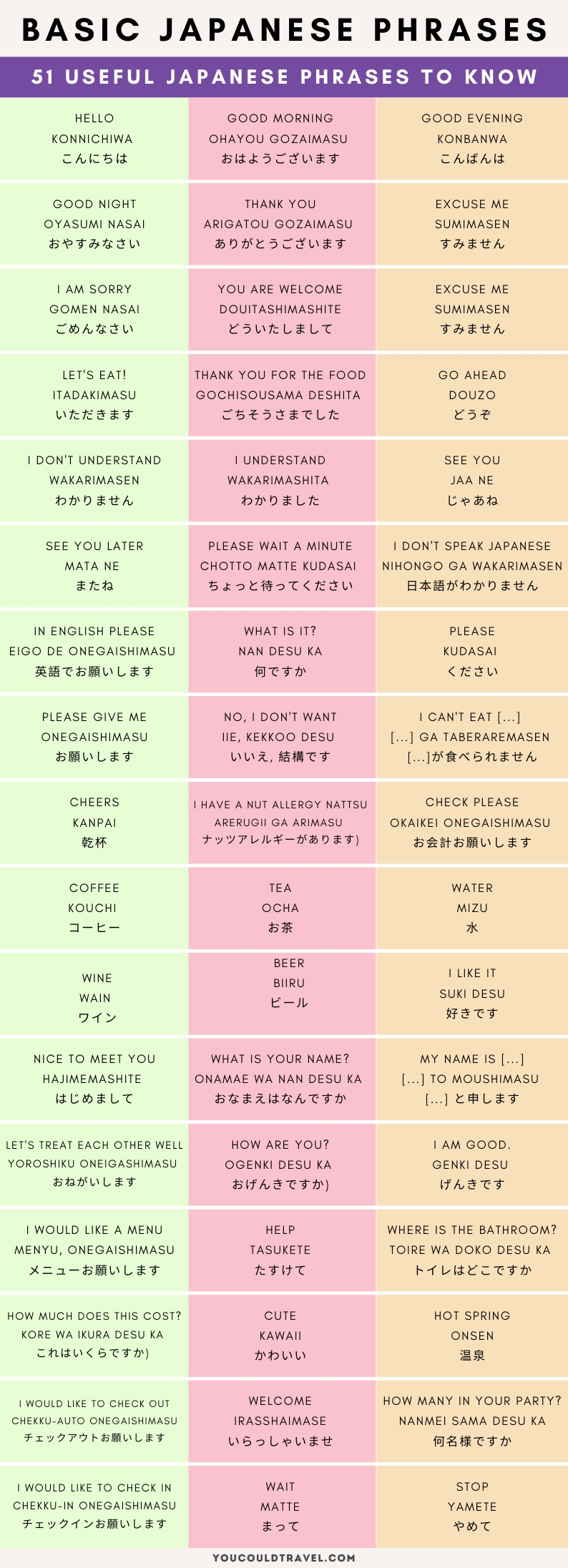
You want to learn Japanese and not sure where to start? I’ve started with Japanese quite a while ago and let me tell you, there are now so many great ways to support your learning journey.
I tried different methods, like language apps, but they didn’t get me very far. The best way to learn Japanese is to combine a variety of books and methods.
For English speakers, the U.S. Foreign Service Institute (FSI) classifies Japanese as a Category IV language, meaning it is considered one of the most difficult languages for native English speakers to learn. FSI estimates that it takes around 2,200 hours of study to achieve general professional proficiency in speaking and reading Japanese.
So how can it be done?
Get Japanese textbooks – I, personally, LOVE and recommend Japanese from Zero. It’s one of the books that I found the most useful for my language journey. It’s very comprehensive. Marugoto is another coursebook that I recommend. This is what I’m using as part of my Japanese language class. It was recommended by our Sensei (せんせい, teacher).
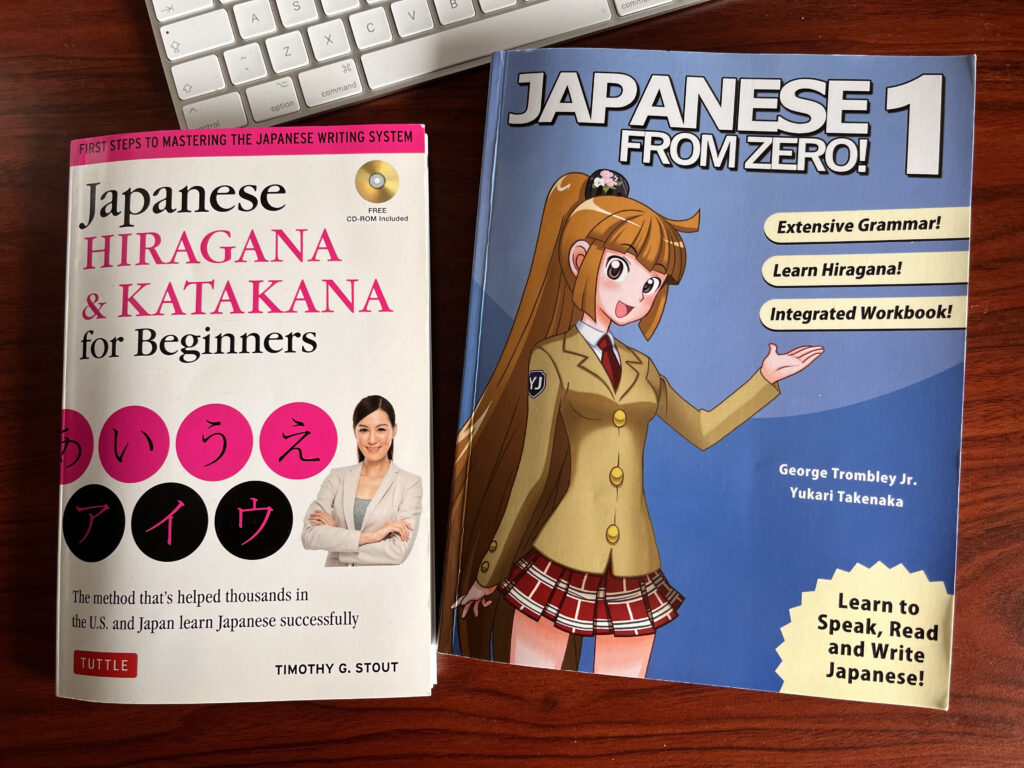
Learn the kana and kanji – To get started, you will want to learn hiragana and katakana as fast as possible. This will enable you to read and write in Japanese. Someday, you will learn many kanji characters too, but focus on the first task. I know it sounds crazy, but it can take less than a month to master both Hiragana and Kanji. No, I’m not joking. I used and recommend the book called Japanese Hiragana and Katakana for Beginners. The trick is to use mnemonics!
Japanese course at home – I used (and continue to use) Japanese with Aimee. I even wrote a whole review about it. The idea is that Aimee teaches Japanese in 5-10 minutes a day, making it easier to learn basics fast and efficient. This course is incredibly useful for those who want bite size information.
Japanese classes – I recently joined a Japanese class here in the UK and I couldn’t be happier. I realized that as much as I’ve learnt from books, movies and courses, it is not enough without the day-to-day practice on pronunciation and speech. Practising with other students and the teacher is invaluable. I appreciate it that language classes can be expensive, but there are ways to find them affordable. Look for adult classes and Japanese class communities in your city.
Watch movies and anime – You love Japan, so you might as well immerse yourself in everything Japanese. Watch anime in Japanese with English subtitles. You will soon start to recognize words (yay!). Then watch movies, TV series and shows like Terrace House for example. It gives you a glimpse into Japanese culture, and you get to listen to how natives actually talk.
Visit Japan – I visited and lived in Japan too, so I cannot tell you how useful it is to know a little Japanese and immerse yourself in everything all around you. This will make it easier to absorb information, you will be able to read simplified Japanese and even have short conversation. Now that will definitely make you feel like a superhero!
Whoohoo, this was a lot, but you did it! You now know a lot of really great Japanese phrases you can use on your next trip to Japan.
Frequently Asked Questions
What are some cool Japanese sayings?
Here are 10 of the coolest Japanese slang you will probably hear in Japan when you spend time around younger people:
Maji de (マジで) – Seriously?
Dasai (ダサい) – Uncool
Kimoi (キモい) – Gross or Creepy
Meccha (めっちゃ) – Very (meaning, “super” or “extremely”)
Gachi (ガチ) – Serious (meaning, “for real”
Ikemen (イケメン) – Handsome (literally, “cool man”)
Otaku (オタク) – Geek or nerd (referring to someone with interest in anime, manga, or gaming)
Yabai (ヤバい) – Dangerous or risky (can also mean “cool” or “amazing”)
Ike teru (イケてる) – Cool or trendy (meaning, “looks good” or “stylish”)
Maji kichi(マジキチ) – Crazy or insane or nuts!
Umai (ウマい) – Delicious or tasty
Doki doki (ドキドキ) – Excited or nervous (referring to a racing heart)
Waku waku (ワクワク) – Excited or thrilled (referring to a feeling of anticipation or excitement)
What is a popular Japanese phrase?
The most popular Japanese phrases you will use the most in Japan are:
Konnichiwa (こんにちは) – Hello
Arigatou gozaimasu (ありがとうございます) – Thank you
Sumimasen (すみません) – Excuse me
Hai (はい) – Yes
Iie (いいえ) – No
Itadakimasu (いただきます) – Enjoy your meal
Gochisousama deshita (ごちそうさまでした) – Thank you for the meal
What are 4 phrases commonly spoken in Japanese?
The following are some essential, must known phrases you will hear all around you in Japan:
Konnichiwa (こんにちは) – Hello
Konbanwa (こんばんは) – Good evening
Arigatou gozaimasu (ありがとうございます) – Thank you
Sumimasen (すみません) – Excuse me
Itadakimasu (いただきます) – Enjoy your meal
Gochisousama deshita (ごちそうさまでした) – Thank you for the meal
Onegaishimasu (お願いします) – Please give me, or I humbly request
Douzo” (どうぞ) – Go ahead or here you are (when something is given to you)
Hai (はい) – Yes
Iie (いいえ) – No

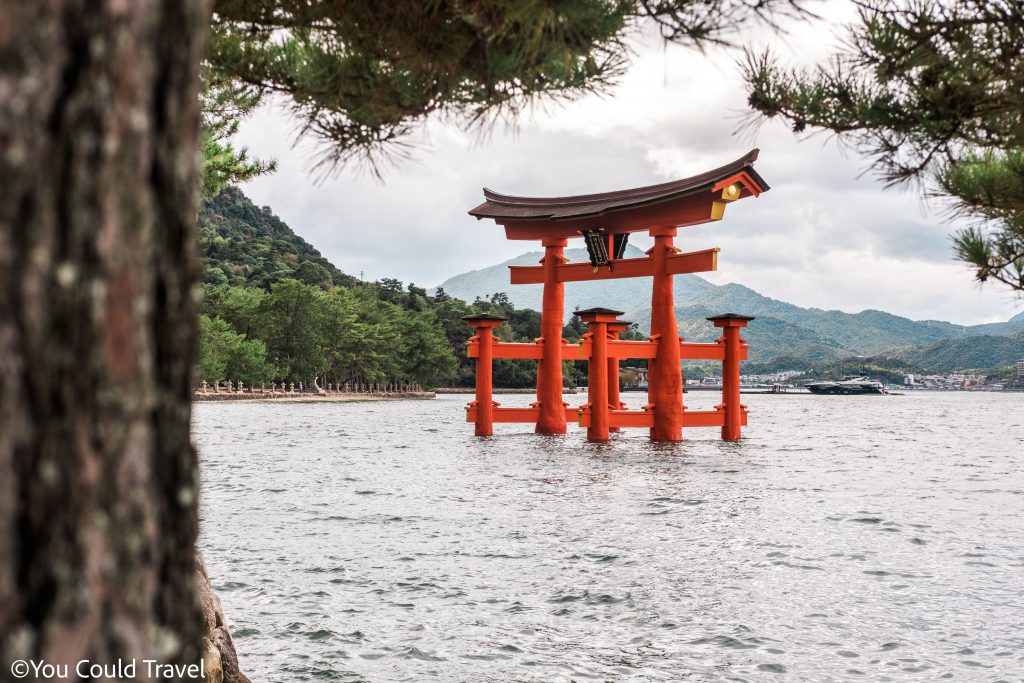
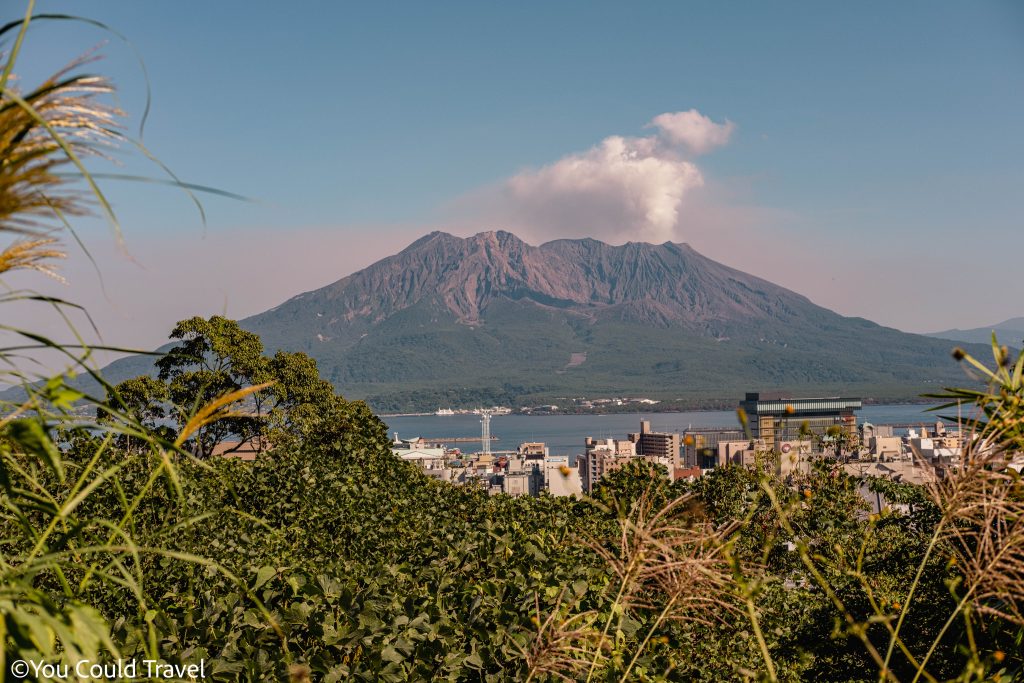
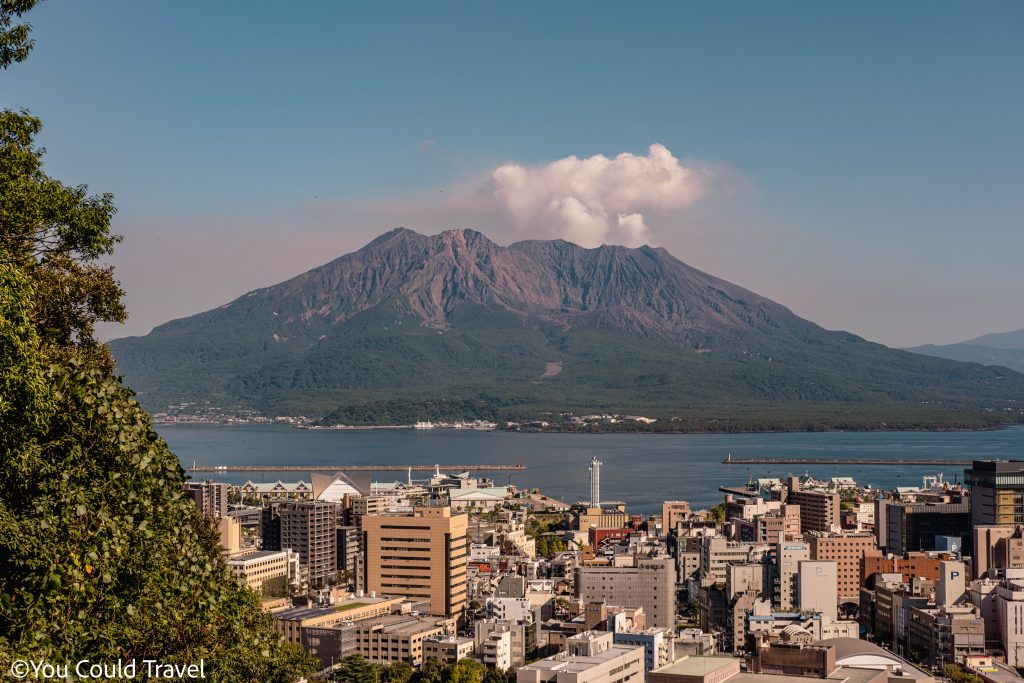

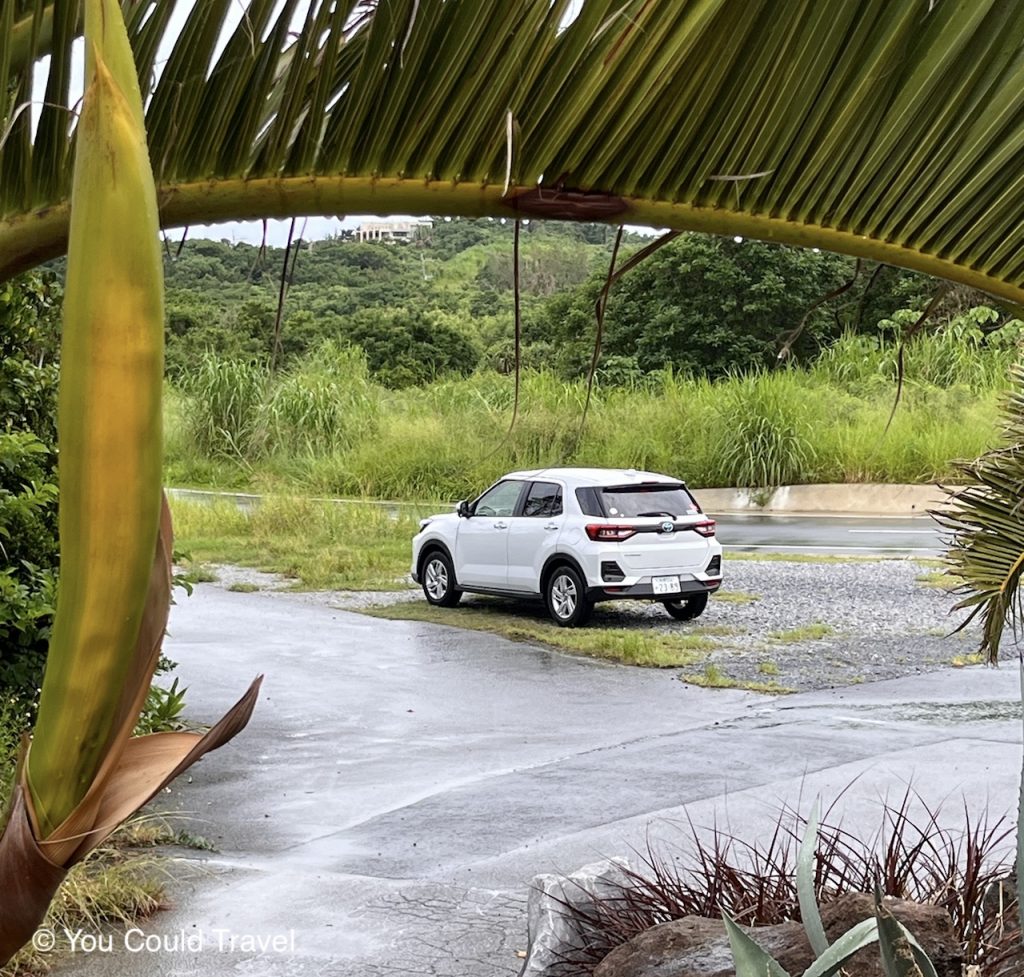

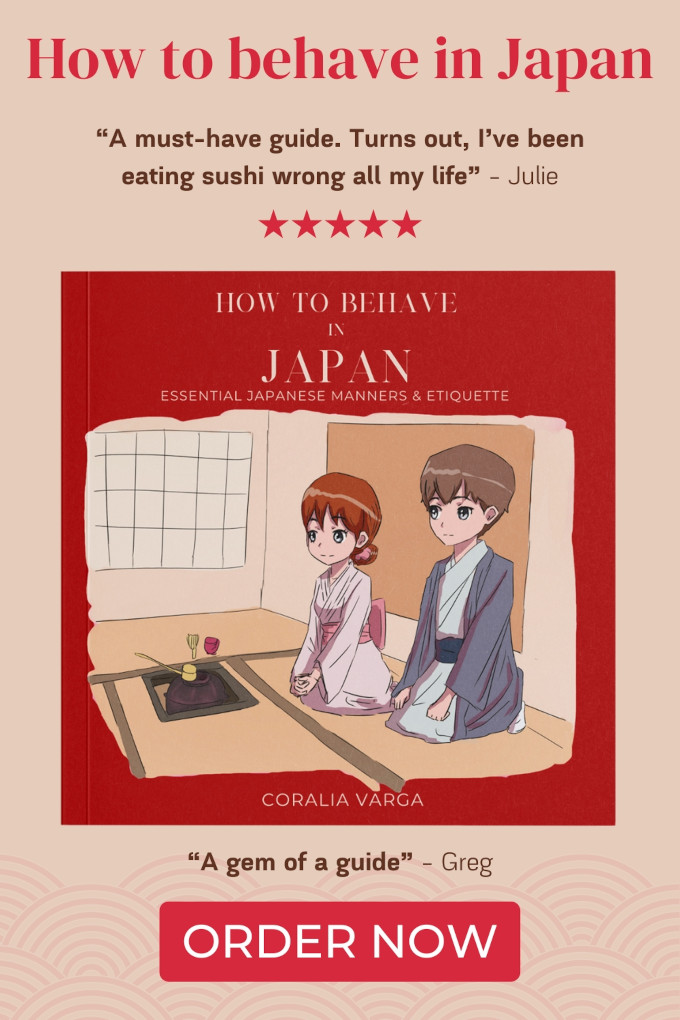

Leave a Reply